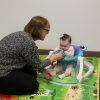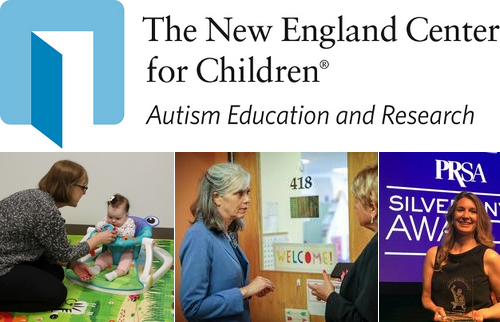Above: NECC has been making news for their continuing efforts to research autism and advocate for those who have it.
The New England Center for Children has been making news again. Here is a round up of stories on the Southborough based autism education and research institute.
 Infant Sibling Project
Infant Sibling Project
Because siblings of children with autism have a one in five chance of also developing it, NECC staff are studying infant siblings to identify early markers. The effort follows up on a 2017 study in Wisconsin.
WBZ news interviewed the doctor leading the study (Dr. Rebecca McDonald, PhD, BCBA) and a mother with two children on the autism spectrum who enrolled her infant in the study:
“What they found was that when they identified those markers and treated them right away, they could prevent a full onset of an autism diagnosis,” Dr. MacDonald said.
In her study, babies younger than 6 months with affected siblings undergo an assessment in their homes every other week until they’re at least 2 years old. Lauren’s third child, 3-month old Graeme, is one of those babies.
Dr. MacDonald looks for eye contact, tracking an object from side to side, turning their head to sounds (like the shake of a rattle), babbling and smiling.
If red flags are found, treatment begins immediately.
“I feel as a parent it takes the pressure off of me of staring at him and waiting for the ball to drop,” Byron said. (read more)
According to the story, NECC is still looking for more participants:
The study is still recruiting pregnant women who have a child diagnosed with autism and babies up to 6 months of age with a sibling with autism.
For more information, contact Dr. Becky MacDonald at bmacdonald@necc.org or 508-481-1015 or visit the study’s website.
The Telegram also covered the study in March. It’s article shared an example of the team’s success with early intervention:
One little boy was identified at 8 weeks, Ms. MacDonald said. The team began by coaching his mother about specific behaviors to look for and ways to teach and reinforce responses.
At 6 months, the boy received 15 hours a week of in-home Applied Behavior Analysis therapy. ABA uses systematic prompting and reinforcement to increase behaviors that are helpful and decrease those that are harmful or get in the way of learning.
He still showed symptoms at 1 year, so after he was given a full neurobehavioral assessment, he began receiving 30 hours a week at home of ABA therapy.
Now 16 months old, he smiles, he looks at people in his environment, he points, looks and gives objects. He still has language delays but is much better, according to Ms. MacDonald. (read more)
 Visit from Representative Katherine Clark
Visit from Representative Katherine Clark
Last week, our U.S. Congressional Representative visited NECC. According to NECC’s press release, the purpose was for Clark to learn about the autism research NECC is conducting “in the field of applied behavior analysis.”:
Congresswoman Clark has been a strong proponent of special education and her tour and discussions with NECC deepened her understanding and commitment to educating children with autism. . .
[Clark said,] “I had the privilege of meeting the administration, teachers and students of NECC to learn how their best practices help transform the lives of children with autism and their families. I will continue to prioritize and work to address the special education needs of my constituents.”. . .
In fall 2018, [Clark] was elected by her colleagues to serve as Vice Chair of the Democratic Caucus, making her the sixth highest ranking Democrat in the 116th Congress. Additionally, she serves as a member of the U.S. House Committee on Appropriations and the Steering and Policy Committee within the Caucus. (read more)
 PR Award for “Giving Autism a Voice”
PR Award for “Giving Autism a Voice”
Earlier this summer, NECC received the Award of Excellence 2019 for Most Effective Campaign for Nonprofit Organizations. The award was given by the Public Relations Society of America (PRSA):
PRSA is the nation’s leading professional organization serving the communications community. The Silver Anvil Awards honor the best public relations campaigns of the year and the highest standards of performance for the profession. NECC received their award at the Silver Anvil Awards ceremony in New York’s Edison Ballroom on June 6.
PRSA’s Award of Excellence was given to NECC for their “Giving Autism a Voice” campaign, which resulted in major national and regional media coverage including The New York Times, Boston Globe (front page), Washington Post, major market broadcast, and dozens of regional, online, and trade media.
“Increasing autism awareness and understanding is key to helping children with autism and their families. We are proud of our work in communicating NECC’s mission via the media,” said Vincent Strully, NECC President and CEO. “Behind this award was a strategic PR program built on media-friendly messaging, thought leadership, smart packaging and creative pitch angles. NECC uncovered the human interest stories and wove the school’s education, technology and research into the fabric of our students’ successes.” (read more)
I was curious about the national coverage referenced in the story. Here are some more 2018/19 stories mentioning NECC that I dug up:
- Washington Post – letter to the editor – Set aside the autism wars. Families need solutions today. – May 20, 2019
- NY Times – Vocations feature – She Has Worked Hard at Her Job for 20 Years. She Has Autism. – April, 2019
- The Boston Globe – Lifestyle/Names feature – NECC gala raises $775,000 for autism education and research – December 14, 2018
- The Boston Gl0be – The Big Picture feature – Raising Connor – May 3, 2018
- Boston Herald – High School Sports feature – Will Pacheco sparks community support of autism, brother – May 9, 2019


